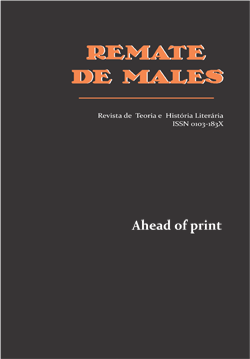Abstract
Oscar Wilde’s tomb, at Père-Lachaise cemetery in Paris it’s enclosed by a glass barrier installed with the aim of keeping the monolith conceived by Jacob Epstein safe from the insolent mout
Oscar Wilde’s tomb, at Père-Lachaise cemetery in Paris it’s enclosed by a glass barrier installed with the aim of keeping the monolith conceived by Jacob Epstein safe from the insolent mouths that instead on leaving their lipstick marks upon it. Such urge to preserve the past, and in this case a heteronormative past, says a lot about literary criticism itself, which for decades evaded the queer facet of Wilde’s works. In this essay, I carry out an literature review on Wilde’s criticism, pointing out impasses and omissions regarding treatment of his work and biography, especially when homoaffective issues are concerned. I present some quarrels that divided gay and queer studies in their initial approach to Wilde; I explore critical works unfolding Wilde’s work and biography, particularly related to the fin de siècle studies and its relation to the modern sexual politics, and I close this essay with a critical comment on the films Wilde (1997) and Velvet Goldmine (1998), which exemplify the different approaches to the author’s image.
hs that instead on leaving their lipstick marks upon it. Such urge to preserve the past, and in this case a heteronormative past, says a lot about literary criticism itself, which for decades evaded the queer facet of Wilde’s works. In this essay, I carry out an literature review on Wilde’s criticism, pointing out impasses and omissions regarding treatment of his work and biography, especially when homoaffective issues are concerned. I present some quarrels that divided gay and queer studies in their initial approach to Wilde; I explore critical works unfolding Wilde’s work and biography, particularly related to the fin de siècle studies and its relation to the modern sexual politics, and I close this essay with a critical comment on the films Wilde (1997) and Velvet Goldmine (1998), which exemplify the different approaches to the author's image.
References
BERGONZI, Bernard. Aspects of the Fin de Siècle. In: POLLARD, Arthur. The Penguin History of Literature: The Victorians. New York: Viking 1993, pp. 279-292.
BUCKLEY, Jerome Hamilton. The Victorian Temper: A Study in Literary Culture. New York: Random House, 1951.
COHEN, Ed. Talk on the Wilde Side: Towards a Genealogy of Discourse on Male Sexualities. New York: Routledge, 1993.
CROFT-COOKE, Rupert. Feasting with Panthers: A New Consideration of Some Late Victorian Writers. New York: Holt Rinehart/Winston, 1967.
DELLAMORA, Richard. Representation and Homophobia in The Picture of Dorian Gray. Victorian Newsletter, v. 31, n. 3, Spring 1988, p. 28-31.
DELLAMORA, Richard. Masculine Desire: The Sexual Politics of Victorian Aestheticism. Chapel Hill: University of North Carolina, 1990.
ELLMANN, Richard. Oscar Wilde. New York: Knopf, 1988.
FINCHER, Max. Queering Gothic in the Romantic Age: The Penetrating Eye. New York: Palgrave Macmillan, 2007.
FISCHER, Erns. Art Against Ideology. Trad. Anna Bostock. London: Penguin, 1969.
FOUCAULT, Michel. The History of Sexuality. Volume I: An Introduction. Trad. Robert Hurley. New York: Pantheon Books, 1978.
FONE, Byrne. A Road to Stonewall: Homosexuality and Homophobia in British and American Literature, 1750-1969. New York: Twayne, 1995.
GEE, Stephen. Gay Activism. In: Gay Left Collective (Ed.). Homosexuality: Power and Politics. London: Allison and Busby, 1980, pp. 337-347.
GILMAN, Richard. Decadence: The Strange Life of an Epithet. New York: Farrar, Straus, and Co., 1979.
GORDON, Jan B. Decadent Spaces: Notes for a Phenomenology of the Fin De Siècle. In: FLETCHER, Ian. Decadence and the 1890s. New York: Holmes and Meier, 1979, pp. 53-88.
HAYNES, Todd. Director’s Statement. In: Velvet Goldmine. London: Faber and Faber Ltd., 1998a, pp. 75-76.
HAYNES, Todd. Roteiro para Velvet Goldmine. In: Velvet Goldmine. London: Faber and Faber Ltd., 1998b, pp. 16-73.
HEWITT, Andrew. Political Inversions. Stanford, CA: Stanford University Press, 1996.
KAYE, Richard. Gay Studies/Queer Theory and Oscar Wilde. New York: Palgrave Macmillan, 2004.
MCCARTHY, Mary. The Unimportance of Being Oscar. In: Theater Chronicles: 1937-1962. New York: Farrar, Straus, and Co., 1963.
PIERROT, Jean. The Decadent Imagination, 1880-1900. Chicago: University of Chicago Press, 1981.
RODITI, Edouard. Oscar Wilde. New York: New Directions, 1986.
SEDGWICK, Eve Kosofsky. Epistemology of the Closet. Los Angeles: University of California Press, 1990.
SEDGWICK, Eve Kosofsky. Between Men: English Literature and Male Homosexual Desire. New York: Columbia University Press, 2015.
SHOWALTER, Elaine. Sexual Anarchy – Gender and Culture at the Fin de Siècle. New York: Viking Penguin, 1990.
SMALL, Ian. Oscar Wilde: Recent Research. Greensboro: ELT Press, 2000.
TÓIBÍN, Colm. Love in a Dark Time, and Other Explorations of Gay Lives and Literature. New York: Scribner, 2002.
UPDIKE, John. More Matter. New York: Alfred Knopf, 1999.
VELVET GOLDMINE. Direção e roteiro de Todd Haynes. Produção: Christine Vachon, Michael Stipe. Estados Unidos, Killer Films, 1998. Filme (123min). HBO Max.
WEIR, David. Decadence and the Making of Modernism. Amherst: University of Massachusetts Press, 1995.
WILDE. Direção de Brian Gilbert. Roteiro de Julian Mitchell. Produção: Marc Samuelson, Peter Samuelson. Inglaterra, BBC Films, 1997. Filme (118min). HBO Max.
WILDE, Oscar. The Picture of Dorian Gray (1890). In: FRANKEL, Nicholas (Ed.). Oscar Wilde: The Uncensored Picture of Dorian Gray. Londres: Cambridge University Press, 2012, pp. 55-235.
WILSON, Edmund. Oscar Wilde: One Must Always Seek What is Most Tragic. In: Classics and Contemporaries: A Literary Chronicle of the Forties. New York: Farrar, Straus, and Co., 1950, pp. 331-342.

This work is licensed under a Creative Commons Attribution-NonCommercial 4.0 International License.
Copyright (c) 2023 Creative Commons Licence


